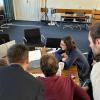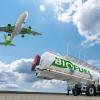
IIASA hosted the second annual project meeting for the Horizon Europe project Assessing Climate Change Risk in Europe (ACCREU), bringing together research partners to discuss the way forward in tackling climate change risks across Europe.
The second project meeting of the ACCREU project took place at IIASA from 15-16 February in a hybrid format. The meeting brought together members of the ACCREU consortium to take stock of key project milestones, and to plan and coordinate upcoming work in 2024 and 2025. Among the roughly 30 in-person participants were researchers from 14 consortium partners. The core objective of ACCREU is to cover existing knowledge gaps while investigating climate change impacts, mitigation, adaptation, and prospects for a social and economic sustainable development in a fully integrated framework. This means identifying challenges, highlighting opportunities, and delivering practical solutions to policy- and decision makers along with other societal actors at the EU, EU Member State, region, and community level to accelerate a just societal transformation towards climate resilience in the short, medium, and long-term.
The agenda for this meeting included reporting on the project’s co-creation and stakeholder activities including adaptation case studies and development of adaptation pathways. Modeling teams provided progress reports on their efforts to advance state of the art methods in modeling the physical and socioeconomic cost of climate change impacts and adaptation and its effectiveness in different sectors including infrastructure and the built environment; food, energy, and water; health and wellbeing; ecosystems and biodiversity including fire risk; and extremes, catastrophic events, and supply chains.
The macroeconomic and IAM modeling teams also provided feedback on their efforts to integrate adaptation, mitigation, and residual damages from sectoral models. In addition, outreach and dissemination activities were discussed, including the project website, and social media accounts on Twitter and LinkedIn.
News

23 July 2024
Fostering transformation of agrifood systems in Indonesia

22 July 2024
Are sustainable aviation fuels truly sustainable?

17 July 2024


